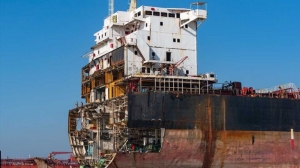


(Posted on 12/06/20)
DNV GL, the world’s leading classification society, has launched a new guidance on recycling to help shipowners navigate a regulatory environment that is becoming increasingly complex. With the IMO Hong Kong Convention not yet in force, strict enforcement of the EU Ship Recycling Regulation (EU SRR) and the EU Waste Shipment Regulation (EU WSR) means shipowners must carefully plan for the end of life of their vessels.
Shipowners looking to make informed, economic and responsible decisions about how to deal with vessels at the end of their lifecycles face a much stricter and more complex set of international, regional and national requirements than in the past. With regulators targeting shipowners with significant financial penalties, even criminal offences, shipowners need a careful and considered strategy for dealing with ship recycling of their vessels.
“Ship recycling is an area where we can see significant pressure building in our industry, both from regulators, wider stakeholder groups and the public,” said Knut Ørbeck-Nilssen, CEO of DNV GL – Maritime. “This means that ensuring compliance is essential for shipowners looking to protect their reputations and businesses, while building trust that their vessels are recycled in a safe and sustainable manner.”
The new guidance: “SHIP RECYCLING: NAVIGATING A COMPLEX REGULATORY LANDSCAPE”, aims to give a better basis for decisions on the recycling of vessels. It sets out the main recycling options, the legal, reputational and financial risks, and provides a process that can help to assess whether an individual yard is likely to carry out recycling to an acceptable level, in line with recognised regulations and standards. This process has been designed by DNV GL to provide owners a template for action, in the absence of internationally accepted certifications outside the EU scheme, when they are dealing with yards not on the EU approved list.
“Recent cases have shown that without a clear awareness of the risks within the complex regulatory landscape that surrounds recycling, shipowners can find themselves facing major financial and opportunity losses,” says Jannicke Eide Fredriksen, DNV GL – Maritime. “With this new guidance, DNV GL is working to support shipowners in their decisions, by setting out the standards involved and the many critical factors to consider, primarily when dealing with yards that are not included on the EU approved list.”
AtoB@C Shipping, a subsidiary of ESL Shipping, has announced the successful delivery of Fleximar, the... Read more
Western Bulk, together with reputable Norwegian partners A/S J. Ludwig Mowinckels Rederi, Premium Maritime... Read more
Pacific Basin Shipping Limited, one of the world’s leading dry bulk shipping companies, has announced... Read more
Columbia Group anticipates a period of strong expansion as an increasing number of international shipowners... Read more
Norse?Ship Management has expanded its use of Smart Ship Hub’s high frequency sensor data and... Read more
As the maritime industry gears up to welcome the IMO’s STCW bullying and harassment training amendments... Read more
NORDEN has acquired the cargo activities of Taylor Maritime in Southern Africa (previously operated... Read more
Philippos Ioulianou, Managing Director of EmissionLink, has warned the IMO’s decision to delay... Read more
VIKAND has highlighted the need for cultural change in the maritime sector as reports of bullying, harassment... Read more
The maritime industry is experiencing a period of significant transformation, driven by rapidly evolving... Read more